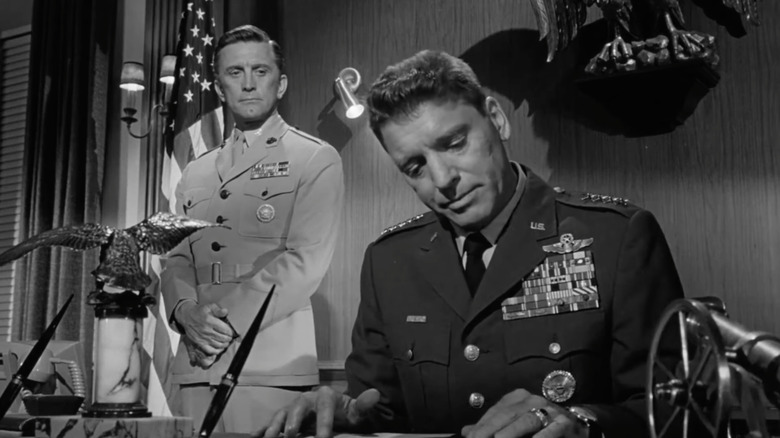The Twilight Zone Creator Rod Serling Wrote A Classic 60s Political Thriller
The terror in "The Twilight Zone" always comes from "What if?" What if there was a little boy with way too much power for anyone to tell him "no"? What if what you thought of as Heaven turned out to be more like Hell? What if man-eating aliens arrived and made humans as docile as lambs to the slaughter?
These questions may be outrageous fantasy, but the terror of them is timeless. We still watch "The Twilight Zone" decades later, and the best episodes can still leave you chilled — all thanks to the imagination of series creator Rod Serling.
Serling is synonymous with "The Twilight Zone" even for casual viewers; one could call him TV's first auteur. His reputation was as much thanks to his on-camera work as his writing. Serling was the narrator of "The Twilight Zone," introducing and closing out each episode. (He got the job after efforts to recruit Orson Welles fell through.) When people think of "The Twilight Zone," they probably hear those three words in Serling's voice.
That's not to boil Serling down to only his greatest achievement. He had a film screenwriting career, famously contributing to 1968's "The Planet of the Apes" (the twist ending with the Statue of Liberty is classic "Twilight Zone"). Nor did he limit himself to science-fiction. He also wrote the script for the 1964 black-and-white Cold War political thriller "Seven Days In May" (adapted from a novel by Fletcher Knebel and Charles W. Bailey II).
The movie is a lot more realistic than any "Twilight Zone" episode, but it's still speculative fiction carved from the defining question of Serling's career. Set in the then near-future of 1970, "Seven Days In May" asks what might happen if the U.S. President signed a nuclear armistice with the Soviet Union. The answer? A military coup.
Rod Serling's script for Seven Days in May is still relevant today
1964 was a sterling year for Hollywood Cold War thrillers. The world was coming off of the Cuban Missile Crisis, so fear of nuclear war was even higher than usual. Stanley Kubrick's "Doctor Strangelove" and Sidney Lumet's "Fail Safe" both centered around nuclear armageddon born of communication breakdowns. "Seven Days in May" is the third leg in this triptych.
While Serling was a master of satire, "Seven Days in May" is closer to the straight-laced "Fail Safe" than the farcical "Strangelove." Directed by John Frankenheimer (coming off of "The Manchurian Candidate," about a brainwashed Korean War veteran), the film is a conspiracy picture full of suspense and intrigue.
The set-up: President Jordan Lyman (Fredric March) has negotiated a nuclear disarmament treaty with the USSR. Most of the American public is opposed, including Joint Chiefs of Staff Chairman General James Mattoon Scott (Burt Lancaster). Scott's right-hand, Colonel Martin Casey (Kirk Douglas) discovers evidence that his boss is planning a military coup against Lyman to stop the treaty from being signed. It's especially dangerous because Scott has the public support needed to cement his power should he try to grab it. The supposed coup is set to go off in less than a week, so Casey is on a tight deadline to both get to the bottom of the plot while convincing the President of the danger. But who else can they trust?
The film is believed to be based in part on General Douglas MacArthur and his squabbles with President Harry Truman over Cold War policy (MacArthur was removed from power by Truman in 1951). Though it mixes history and speculation, "Seven Days in May" feels all too relevant to the present day, where many Americans have proven willing to give away their democracy to strongmen demagogues.
How Burt Lancaster's politics influenced his movies
Lancaster was a liberal lion (shortly before his death in 1994, he was still campaigning for Michael Dukakis and filming ads for the American Civil Liberties Union). Yet he plays the authoritarian General Scott with conviction, creating a warning of men like him. It wasn't the only time he played the role of a heel in a message picture.
Compare General Scott to Lancaster's part as Dr. Ernst Janning in 1961's "Judgment at Nuremberg" by director Stanley Kramer. The film depicts a fictionalized version of the post-World War 2 Nuremberg military tribunals in Germany, where Nazi officers and collaborators were tried for their crimes under the deposed regime. Janning is a judge who kept working after Hitler came to power, trying cases and convicting defendants under Nazi law. Unlike the other defendants, Janning has his regrets — he never believed in the Nazis, yet did his "duty" because he believed in Germany — but the film (and Judge Dan Haywood, played by Spencer Tracy) concludes those aren't enough to exonerate him.
"Judgment at Nuremberg" is about a people who did let themselves be taken over from within by a demagogue. The film's thesis is that they can't forget that, feign ignorance to what was happening, or go unpunished. It feels like a spiritual sibling to 2023's "The Zone of Interest." "Seven Days of May" confines itself to the halls of power, so it's difficult to say it's an alternative about what an everyman should do when faced with tyranny. Both these Lancaster-led films, though, remind their viewers that not only is democracy a group effort, fascism is too.


